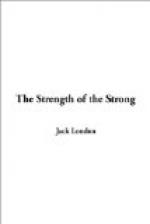“You are an old woman to be working like this,” I ventured.
She looked at me with that strange, unblinking gaze, and she thought and spoke with the slow deliberateness that characterized everything about her, as if well aware of an eternity that was hers and in which there was no need for haste. Again I was impressed by the enormous certitude of her. In this eternity that seemed so indubitably hers, there was time and to spare for safe-footing and stable equilibrium—for certitude, in short. No more in her spiritual life than in carrying the hundredweights of grain was there a possibility of a misstep or an overbalancing. The feeling produced in me was uncanny. Here was a human soul that, save for the most glimmering of contacts, was beyond the humanness of me. And the more I learned of Margaret Henan in the weeks that followed the more mysteriously remote she became. She was as alien as a far-journeyer from some other star, and no hint could she nor all the countryside give me of what forms of living, what heats of feeling, or rules of philosophic contemplation actuated her in all that she had been and was.
“I wull be suvunty-two come Guid Friday a fortnight,” she said in reply to my question.
“But you are an old woman to be doing this man’s work, and a strong man’s work at that,” I insisted.
Again she seemed to immerse herself in that atmosphere of contemplative eternity, and so strangely did it affect me that I should not have been surprised to have awaked a century or so later and found her just beginning to enunciate her reply—
“The work hoz tull be done, an’ I am beholden tull no one.”
“But have you no children, no family, relations?”
“Oh, aye, a-plenty o’ them, but they no see fut tull be helpun’ me.”
She drew out her pipe for a moment, then added, with a nod of her head toward the house, “I luv’ wuth meself.”
I glanced at the house, straw-thatched and commodious, at the large stable, and at the large array of fields I knew must belong with the place.
“It is a big bit of land for you to farm by yourself.”
“Oh, aye, a bug but, suvunty acres. Ut kept me old mon buzzy, along wuth a son an’ a hired mon, tull say naught o’ extra honds un the harvest an’ a maid-servant un the house.”




